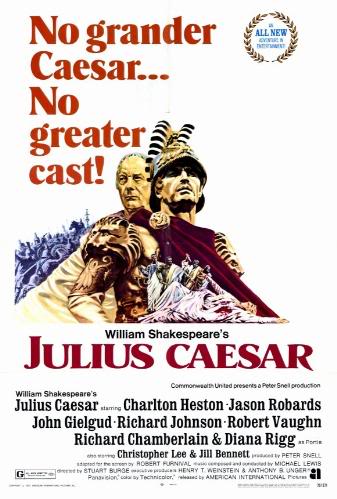
JULIUS CAESAR
UK, 1970, 117 minutes. Colour.
Charlton Heston, Jason Robards, John Gielgud, Richard Johnson, Robert Vaughn, Richard Chamberlain, Diana Rigg, Christopher Lee, Jill Bennett, Derek Godfrey, Michael Gough.
Directed by Stuart Burge.
This competent and often effective version of Shakespeare’s play has many fine things, notably Richard Johnson’s portrayal of Cassius as a Iago-like political idealist. His performance is so striking that Jason Robards’ rather dead, flat Brutus (with American accent) seems worse than it is by contrast. The film seems something of a confrontation between Cassius and Marc Antony (satisfyingly played by Charlton Heston). Robards’ Brutus never stood a chance, against Marc Antony, of convincing the Roman populace of the justice of the cause.
The text has been pruned, but not drastically, and the actors play their lines for intelligibility rather than for Olivier-style grandeur. The result is an intelligent study of Caesar’s ambition and the idealistic Roman republicans who assassinate on principle without realising that this would only lead to war and more ambitious struggles.
The design is effective, but the film relies on the performances. Despite Gielgud’s fine Caesar, Heston and Robert Vaughn’s fine Casca, attention focuses mainly on Cassius. The film was directed by Stuart Burge who had a forty-year television career but who also directed the Olivier version of Othello in 1966.
1. The popularity of this Shakespeare play? The cinema treatment? The pruning of the text, the opening out of the text?
2. The performances – and the critique of Jason Robards’ Brutus? Its effect on the whole impact of the film?
3. The Shakespearean verse, recited for intelligibility, for drama, for meaning?
4. The interiors, Rome, the homes, the senate? The Roman streets and the procession? The contrast with the battle scenes? The score?
5. Audience knowledge of the history, of the play? How necessary?
6. The editing of the verse, the delivery, the poetry and drama, the memorable quotations that have entered the English language?
7. The credits, the information about Caesar’s campaigns? Spain, Gaul? Caesar the conqueror, against Pompey? His enemies? Caesar’s own pride and ambitions?
8. The pageantry of the initial procession, the introduction to Cassius, his character, as a conspirator, his motivations, love for Rome? How personal? The encounters with Brutus, trying to persuade him of the cause? The intrigues with Casca? The range of the other conspirators, their loyalties to Cassius, their loyalties to Rome? The nature of this republican move against the alleged tyranny of Caesar?
9. Caesar and his triumphal entry into Rome? Caesar’s character? The soothsayer and the warning about the ides of March? Caesar and his relationship to the conspirators, to Brutus, to Marc Antony? The coming of the ides of March, Artemidorus and his warnings? Calpurnia and her dreams? Persuading Caesar not to go to the senate? His decision? The arrival of the conspirators, their plausible argumentation against Calpurnia’s dreams? Going to the senate? The request and the senators coming to plead their causes?
10. The conspirators, each of the characters, motivation? The messages to Brutus, into his house, the slave bringing them in? his interpretations? His relationship with Portia? Their discussions about his fate? Her later death?
11. The assassination, the violence, the stabbing of Caesar, ‘Et tu, Brute’? The reactions and fear of the senators? Fleeing the house? The conspirators and their reactions?
12. Marc Antony, with Caesar, not part of the plot, his being diverted away from the senate house during the assassination? His reaction? Seemingly in favour? His permission to conduct the funeral? His famous speech – persuading the Romans, their listening? Their reactions?
13. The conspirators, their not being able to persuade the crowds? Leaving Rome? The setting up of the battle sequences? The nature of the war?
14. Octavian, his age, experience, strong-willed, the clashes with Marc Antony, the collaboration on the battles against Brutus and the conspirators? Octavian’s later history as the emperor Augustus?
15. Brutus, in the camp, the deaths, the marching to the battlefields, the variety of strategies and arguments? Cassius and the other conspirators? Deaths?
16. Brutus, the dreams, the eve of battle? His sensing defeat, his slave, running on his sword? Antony and the interrogation of the slave, Antony’s comment about Brutus being the finest Roman of them all?
17. The end of an era? Order restored – but leading only to Antony and his visits to Egypt, Cleopatra, the final battles with Octavian?